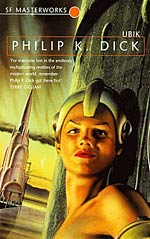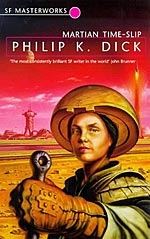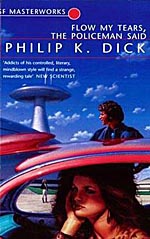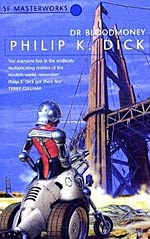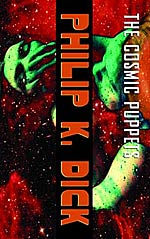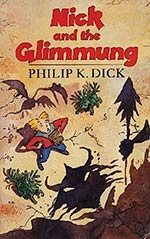Science Fiction at Scribd
Scribd.com is to ebooks and audiobooks what Netflix is to movies and television shows, and Spotify is to songs and albums, and Texture is to magazines. Don’t compare Scribd to Kindle Unlimited because Amazon’s electronic library subscription service is very limited compared to Scribd. Amazon and its subsidiary Audible doesn’t want to offer rentals that compete with its sales.
Over the past decade, there have been a number of online subscription libraries. Many have gone under. Scribd has tweaked it’s service a number of times to stay in business. Scribd really competes with your library’s electronic offerings, but instead of waiting in line for that free audiobook or ebook, you can have what you want immediately.
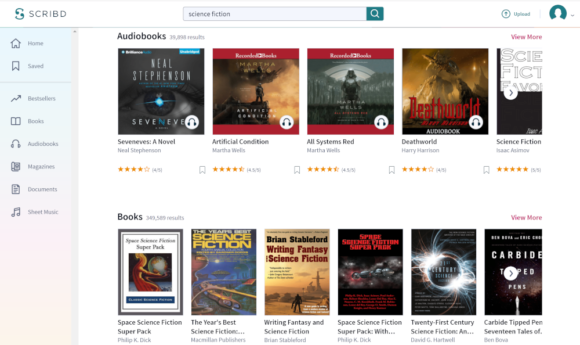
Scribd is $8.99 a month for an all the books you can read with your eyes or ears. Its library is very large, but nothing like the giant sizes of Audible or Amazon. However, its library is impressively large and I consider the $8.99 I spend every month a tremendous bargain. I still buy 24 books a year at Audible, because I do want to own audiobooks. I also buy tons of books at Amazon and ABEbooks. I also use my library regularly. But Scribd is letting me buy less and borrow less. I’m in three nonfiction book clubs and one science fiction book club, and I’m surprised by how often the books voted in are available at Scribd. I’ve saved tons of money.
But here’s a couple tests to see how Scribd does with new science fiction. I’m going to reprint the Best of 2018 lists for science fiction from two sites and color the titles that are available at Scribd. Scrid has a mix of ebook and audiobooks. Red for ebooks, blue for audio, or both colors for both formats.
The 10 Best Science Fiction Books of 2018 – Chicago Review of Books
- Mem by Bethany C. Morrow
- The Book of M by Peng Shepherd
- Semiosis by Sue Burke
- Severance by Ling Ma
- Rosewater by Tade Thompson
- The Calculating Stars by Mary Robinette Kowal
- Black Star Renegades by Michael Moreci
- Blackfish City by Sam J. Miller
- State Tectonics by Malka Older
- The Strange Bird by Jeff Vandermeer
Not bad, huh? Let’s try to make it a little harder.
Goodreads Choice Awards 2018 – Science Fiction
- Vengeful by V. E. Schwab
- Iron Gold by Pierce Brown
- Vox by Christina Dalcher
- Only Human by Sylvain Neuvel
- Red Clocks by Leni Zumas
- Binti: The Night Masquerade by Nnedi Okorafor
- Persepolis Rising James S. A. Corey
- Artificial Conditions by Martha Wells
- The Oracle Year by Charles Soule
- Head On by John Scalzi
- Record of a Spaceborn Few by Becky Chambers
- Star Wars: Thrawn Alliances by Timothy Zahn
- Severance by Ling Ma
- The Calculating Stars by Mary Robinette Kowal
- Rosewater by Tade Thompson
- Ball Lightning by Cixin Liu
- Space Opera by Catherynne M. Valente
- The Gone World by Tom Sweterlitsch
- Revenant Gun by Yoon Ha Lee
- The Consuming Fire by John Scalzi
I think I have more than made my point. I’ve also revealed a secondary bit of knowledge. Most of the books are on audible, and not as ebooks. I wonder why? Maybe publishers think readers want to own books, but audiobooks are a rental kind of thing. Who knows. But I believe I’ve made a good case for subscribing to Scribd if you love audiobooks. However, there are plenty of science fiction ebooks to read. Maybe they focus on the older titles for that format.
The results also make me wonder something else. Are the people who pick the best books of the year partial to audiobooks?
To me, it’s worth $8.99 a month to just try out all these new science fiction books.
JWH
Expanded Universe by Robert A. Heinlein Narrated Bronson Pinchot
Bronson Pinchot does such a fantastic job narrating Heinlein’s old book Expanded Universe (now reprinted in two volumes) that I picture Heinlein sounding like Pinchot. On one hand, I recommend Heinlein fans buying these audiobooks because the narrator brings these old stories into a fresh light, but on the other hand, I also recommend everyone NOT buy these books as a protest against how they are being sold. Encouraging publishers to reprint single-volume books as two volumes makes a terrible precedent!
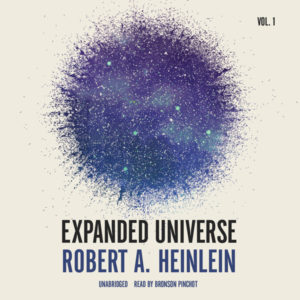
I hate that the Blackstone Audio has followed Phoenix Pick, the current publishers of the ebook/paperback editions of Expanded Universe, by selling Expanded Universe as two audiobooks. This is an absolute rip-off! I didn’t buy it on Audible because I didn’t want to waste two credits on one book. It is worth one credit to fans who want to complete their Heinlein on audio, but not two.
I refused to buy these two-volumes until I saw them on sale at Downpour for $4.95 each. In a weak moment, I crossed my own picket line. So I guess I recommend buying the two-volume audiobook edition if you can get them in a 2-for-1 deal. Even then that galled me! It’s annoying to have one book broken into two parts in my library.
If you just want to read Expanded Universe, I recommend getting the original single volume used at ABEbooks. There are many copies available for less than $4 including shipping.
Can you imagine if it became standard to sell old books in two parts so the publisher can charge twice as much? Expanded Universe isn’t even a large book. On audio, the two volumes run just over 18 hours. Many new science fiction novels run longer. New York 2140 by Kim Stanley Robinson is 22 hours and 34 minutes long. Hell, one credit at Audible can get me The Complete Sherlock Holmes (58 hours) or The Complete Short Stories of J. G. Ballard (65 hours). To expect fans to use two audiobook credits for a medium size audiobook that’s essentially the dregs of Heinlein’s trunk stories is not fair at all.
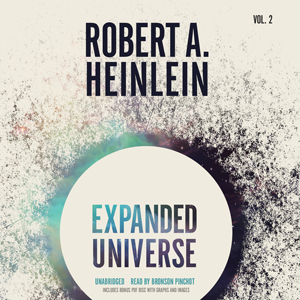
Expanded Universe has always been a kind of publishing rip-off. Expanded Universe reprints a small Ace Book from 1966 called The Worlds of Robert A. Heinlein which I already owned. The first book contained four of Heinlein’s older stories along with one new story, “Free Men” that had been written in 1947 but never published. Sort of like buying an album of older so-so songs with one unpublished out-take as a sales come-on.
In 1980 Ace expanded this little book as The New Worlds of Robert A. Heinlein Expanded Universe. That was an honest enough title, expanding those original five stories to twenty-seven, with introductions. It’s a nice collection of Heinlein’s rejects, forgotten works, and a few famous early stories that would appeal to his hardcore fans. Still, it’s yet another repackaging of Heinlein for his ardent fans. The best of these stories were already in the classic Past Through Tomorrow collection.
Before now, I never really like Expanded Universe or The Worlds of Robert A. Heinlein though. The less famous stories always seemed dated and slight, and few famous stories were in multiple other collections. That is until I heard Bronson Pinchot read them. Most of the stories are from the 1940s and feel moldy. But when listening to Pinchot read them I realized what Heinlein had been trying to do back then, and it’s far more impressive than I ever gave him credit. For example, some of the stories were written before we dropped the A-bomb on Japan, or just after, and they are now eerily relevant again because of Kim Jong-un.
Many of these forgotten stories reveal better characterization and writing than Heinlein gave his readers after 1965. But they also reveal the seeds of his later obsessions. Expanded Universe is a must for people studying Robert A. Heinlein.
Other stories are minor delights for Heinlein fans who enjoy observing how Heinlein progressed as a writer. For example, “They Do It With Mirrors” is Heinlein’s attempt at writing a mystery story, even including his pet fetish for nudism. Because many of the stories have introductions you get a bit of biography with this book too.
I divide Heinlein’s writing into four periods – the 1940s, the 1950s, the 1960s, and everything after 1970. Heinlein thought his best work was Starship Troopers (1959), Stranger in a Strange Land (1961) and The Moon is a Harsh Mistress (1965) and wanted to be remembered for those three books. I thought he peaked with Have Space Suit-Will Travel in 1958, feeling his best books were those published in the 1950s. In my opinion, Heinlein’s storytelling abilities began to decline in the 1960s. Stranger and Mistress still revealed decent storytelling chops, but those skills beginning to be overrun by soap-boxing philosophy, and his books after Mistress are painful for me to read now. I thought his work from the 1940s was good, but not up to his 1950s standards. In the 1960s Heinlein started emulating Ayn Rand, and I think that totally ruined him as science fiction writer.
Hearing these 1940s short stories and essays showcased them in the best possible light, and have changed my mind about Heinlein’s 1940s work. Pinchot dramatizes the stories very effectively, bringing out everything I believe Heinlein intended. Because these stories were never my favorites I never put much effort into reading them properly. Pinchot has done that for me now, and I’m seeing Heinlein with new eyes, (or ears).
Listening to these stories allowed me to grok Heinlein’s writing goals and ambitions in a way I hadn’t before. For example, I’ve always thought “Life-Line” a stupid story for its main idea of scientifically predicting when people will die. This time around I realized that Heinlein was writing a story that attacked how people accept or reject new ideas. Pinchot made its characterization come alive, and I felt like I was watching a 1940s black and white movie full of colorful little character actors like an old Frank Capra flick.
If you want to hear what Pinchot sound like listen to samples at YouTube. Here’s about four minutes of the introduction for the voice of Heinlein, and about five minutes from “Nothing Ever Happens on the Moon” for how Pinchot does character voices.
Normally, I’d hate taking the time to listen to a writer’s lesser works, but Expanded Universe became something I looked forward to listening to every morning during breakfast. If you only have one credit at Audible to invest in hearing Heinlein’s short stories, I’d recommend one of these collections: The Menace From Earth, The Green Hills of Earth, The Man Who Sold the Moon, or Assignment in Eternity. It would be wonderful if someone would hire Bronson Pinchot to read The Past Through Tomorrow which collects many of the stories from these four collections along with the novel Methuselah’s Children.
If you want everything by Heinlein you have to get Expanded Universe. How you rationalize paying double is up to you.
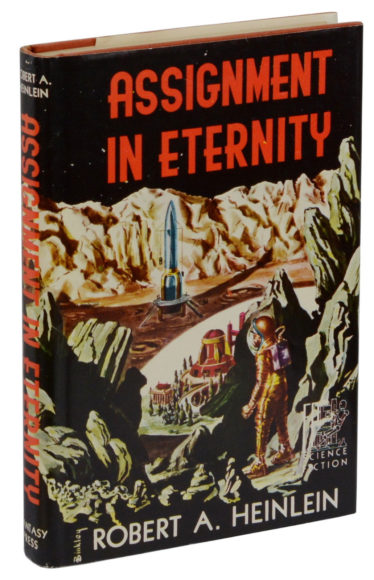
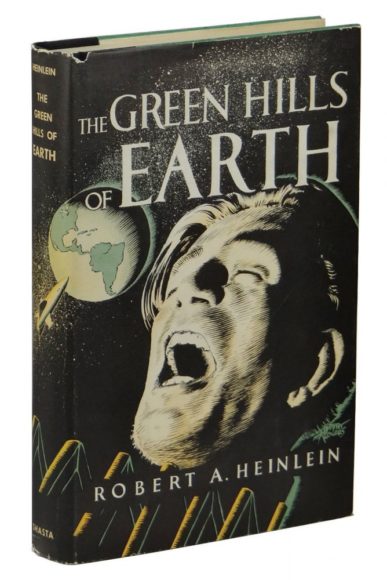
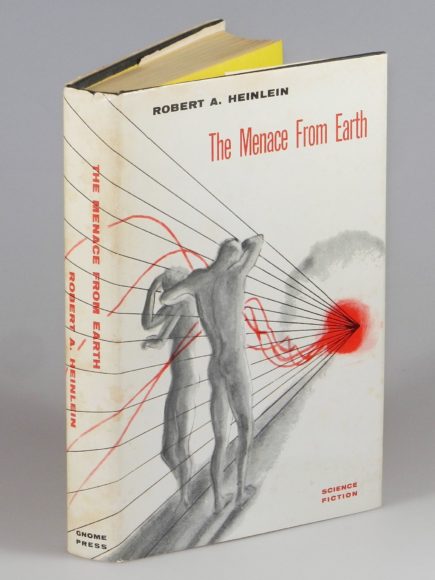
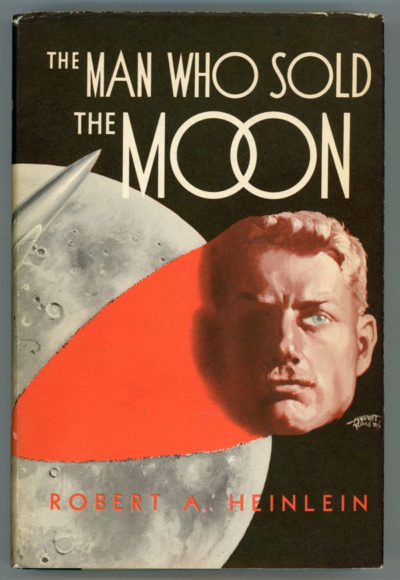
Buying Science Fiction: Paper or Digital?
At my blog, Auxiliary Memory, I’ve been adding Amazon Affiliate links to all the various lists of science fiction books I’ve created. This tedious activity is quite informative. The most obvious trend I spotted, is we’re moving away from mass market paperbacks. They still exist, but far fewer in number. How many people are buying them? Even more surprising is how often I see a mass market paperback cheaper than the Kindle edition. A common price is $7.99 for the ebook, and $7.19 for the mass market paperback. And if you’re an Amazon Prime customer, the price of shipping is built into the paper price. Are they encouraging people to keep buying paperbacks? Or, are ebook prices fixed, and Amazon is discounting the paper?
 On the other hand, many classic science fiction novels are only available in Kindle editions, or Kindle and Audible editions, so the only choice is digital. And the prices for Kindle ebook editions are all over the map. Currently, you can get many of Greg Egan’s great novels from the 1990s for $2.99 each. But other books from that era go for $7.99, $9.99, $11.99 or even $13.99. I can’t believe they price older ebooks equal to cheaper trade paperback editions. But then, the prices for trade paperbacks are moving closer to what hardbacks were not many years ago, and the prices of hardbacks are soaring.
On the other hand, many classic science fiction novels are only available in Kindle editions, or Kindle and Audible editions, so the only choice is digital. And the prices for Kindle ebook editions are all over the map. Currently, you can get many of Greg Egan’s great novels from the 1990s for $2.99 each. But other books from that era go for $7.99, $9.99, $11.99 or even $13.99. I can’t believe they price older ebooks equal to cheaper trade paperback editions. But then, the prices for trade paperbacks are moving closer to what hardbacks were not many years ago, and the prices of hardbacks are soaring.
I found it quite disturbing how many books are only available in digital. My all-time favorite science fiction novel, Have Space Suit-Will Travel can only be bought in an ebook or audio editions. The Kindle is $6.99. Several of Heinlein’s books are only available in these formats. Does that mean fewer people are reading Heinlein? Or, do his fans prefer digital editions? I can understand the flood of forgotten novels from decades past having only Kindle editions. I doubt there are enough buyers to make a print edition break even. And ebooks have been wonderful for bringing back classic SF long out of print. Recently most of Clifford Simak’s novels and short stories showed up in new digital editions.
I tend to think pricing for ebooks is related to the fame of the book or author. Dune, a classic from the 1960s, goes for $9.99. The Diamond Age by Neil Stephenson, from the 1990s goes for $11.99. In the old days, age meant cheap paper editions. I remember buying pocket books costing 35 cents off of twirling wire racks when I was a kid. It’s hard to imagine children plunking down $10 for a Sci-Fi wonder today.
Since I’m adding Amazon Affiliate links I have to decide which is the edition people will most likely want. For the most part, I’ve settle on Kindle editions because they are often cheaper compared to trade paper editions, the common print format. If you consume science fiction versus collecting it, going digital is more thrifty. Digital also seems science fictional too, but I do know that many people still prefer to read off of paper. And I have to wonder how many people prefer spending $14.95 for a trade edition over $7.99 to read a Kindle edition?
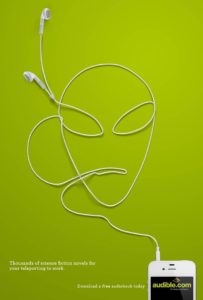 I would love to know: how many people still collect science fiction in hardback?
I would love to know: how many people still collect science fiction in hardback?
Since I’m adding links to the Classics of Science Fiction list, I’m assuming most people are going through the list reading the classics, and not collecting. I’ve been building my own digital library of the Classics of Science Fiction list on the cheap. The Kindle Daily Deals, BookBub, Early Bird Books and LitFlash all send me daily reminders of ebook specials. I’ve bought dozens of books from the Classics of Science Fiction list for $1.99 each. I’m still kicking myself for not buying Jack Faust by Michael Swanwick and Blood Music by Greg Bear from yesterday’s deals. I saw the emails and thought, “I’ll do that in a minute,” and then forget. Damn. Today they are $6.15 and $7.99. Jack Faust has no paper edition, and Blood Music is $13.99 for the trade paper. Although you can get a used hardback copy for $0.01 and $3.99 shipping.
Most of my science fiction collection is digital now, either Kindle or Audible. I only buy paper if it’s much cheaper, the only available format, or I can’t get it from the library. In this regard, I know I’m atypical. I think most science fiction fans prefer to build large collections of visible books. Yet, is that practical with the rising cost of printed books?
I’ve committed to digital. All my Kindle and Audible books are available on my iPhone, which goes with me everywhere. That’s rather futuristic, because I’m carrying around a couple thousand books in my pocket. In the past, when I moved and loaded 2,000+ books in boxes into a truck, it was a huge pain in the lower back. It’s hard to believe I now carry that many books with me everywhere I go.
PKD Bonanza at Audible
 Ever since 2002, I’ve been buying classic science fiction at Audible.com. I love listening to all the great science fiction stories I first discovered in the 1960s and 1970s. I now prefer to hear a book over reading it. I’m not much of a reader — my inner voice is so dull compared to professional audio book narrators. Listening makes a story come alive in a way that reading with my eyes never did. And it’s a special pleasure to “reread” all my favorites this way because it makes them feel new again.
Ever since 2002, I’ve been buying classic science fiction at Audible.com. I love listening to all the great science fiction stories I first discovered in the 1960s and 1970s. I now prefer to hear a book over reading it. I’m not much of a reader — my inner voice is so dull compared to professional audio book narrators. Listening makes a story come alive in a way that reading with my eyes never did. And it’s a special pleasure to “reread” all my favorites this way because it makes them feel new again.
On April 28th Audible.com released 11 Philip K. Dick novels, a 5-volume collection of his complete short stories, and one novella to their already extensive collection of PKD on audio. I assume the 5-volume audio collection contains the same stories that old print edition I own, The Collected Stories of Philip K. Dick published by Citadel Twilight back in the 1990s. Each audio volume has been re-titled from the Subterranean Press edition. Audible, as it often does with short story collections, doesn’t list the stories, and that’s annoying. Each volume is around 20 hours long. Check out the sample recordings. This is a huge dose of PKD – almost 100 hours – maybe an overdose. But I’m going to eventually buy them all.
What’s really exciting for me, is they have published six of the nine literary novels on audio that haven’t been produced before. These include (with date written and date first published):
- Voices from the Street (1952/2007)
- Mary and the Giant (1956/1987)
- Puttering About in a Small Land (1957/1985)
- In Milton Lumky Territory (1958/1986)
- Humpty Dumpty in Oakland (1960/1987)
- The Man Whose Teeth Were All Exactly Alike (1960/1975)
Previously published on audio were the other three mainstream novels.
- Gather Yourselves Together (1952/1994)
- The Broken Bubble (1956/1988)
- Confessions of a Crap Artist (1959/1975)
I wrote about PKD’s literary novels at SF Signal. Confessions of a Crap Artist is my all-time favorite Dick novel. He might have put more work into his literary novels, because at one time he wanted to break out of writing science fiction and go mainstream. It would have meant more money, and he would have proved himself as a “real” writer. Now he’s probably the most famous SF novelist on the planet.
Audible also came out on the 28th with (some are books with new narrators, and some are new to audio):
- Ubik
- Martian Time-Slip
- Flow My Tears, the Policeman Said
- Dr. Bloodmoney
- The Cosmic Puppets
- “Nick and the Glimmung” – novella
Here are PKD’s novels – red means there’s no audio edition at Audible.
- Gather Yourselves Together (1950)
- Voices from the Street (1952)
- Solar Lottery (1954)
- Mary and the Giant (1954)
- The World Jones Made (1954)
- Eye in the Sky (1955)
- The Man Who Japed (1955)
- The Broken Bubble (1956)
- The Cosmic Puppets (1957)
- Puttering About in a Small Land (1957)
- Time Out of Joint (1958)
- In Milton Lumky Territory (1958)
- Confessions of a Crap Artist (1959)
- The Man Whose Teeth Were All Exactly Alike (1960)
- Humpty Dumpty in Oakland (1960)
- Vulcan’s Hammer (1960)
- Dr. Futurity (1960)
- The Man in the High Castle (1961)
- We Can Build You (1962)
- Martian Time-Slip (1962)
- Dr. Bloodmoney, or How We Got Along After the Bomb (1963)
- The Game-Players of Titan (1963)
- The Simulacra (1963)
- The Crack in Space (1963)
- Clans of the Alphane Moon (1964)
- The Three Stigmata of Palmer Eldritch (1964)
- The Zap Gun (1964)
- The Penultimate Truth (1964)
- The Unteleported Man (1964)
- The Ganymede Takeover (1965) with Ray Nelson
- Counter-Clock World (1965)
- Do Androids Dream of Electric Sheep? (1966) (as Blade Runner)
- Nick and the Glimmung (1966)
- Now Wait for Last Year (1966)
- Ubik (1966)
- Galactic Pot-Healer (1968)
- A Maze of Death (1968)
- Our Friends from Frolix 8 (1969)
- Flow My Tears, the Policeman Said (1974)
- Deus Irae (1976) with Roger Zelanzy
- Radio Free Albemuth (1976; published 1985)
- A Scanner Darkly (1977)
- VALIS (1981)
- The Divine Invasion (1981)
- The Transmigration of Timothy Archer (1982)
Thank you Audible, and all the publishers. I can listen to practically everything PKD wrote.
Free Audiobook: The Human Division, Episode 1: The B-Team by John Scalzi
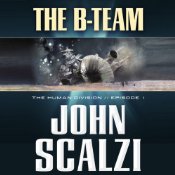 “The Human Division,” John Scalzi’s eagerly awaited return to the Old Man’s War universe, is available at Audible beginning today, January 15. Even more exciting, the first installment of this innovative “episodic narrative” will be available free via Audible’s Facebook page. Episodes 2-13 are available for pre-order and will be released weekly, for $.99 each, through April; fans who choose to pre-order all 12 remaining episodes will automatically receive a new installment of “The Human Division” in their Audible library each Tuesday through April 9. For more information, see here: http://bit.ly/HumanDivisionFREE.
“The Human Division,” John Scalzi’s eagerly awaited return to the Old Man’s War universe, is available at Audible beginning today, January 15. Even more exciting, the first installment of this innovative “episodic narrative” will be available free via Audible’s Facebook page. Episodes 2-13 are available for pre-order and will be released weekly, for $.99 each, through April; fans who choose to pre-order all 12 remaining episodes will automatically receive a new installment of “The Human Division” in their Audible library each Tuesday through April 9. For more information, see here: http://bit.ly/HumanDivisionFREE.
If you’ve not tried audio books before and you’re a Scalzi fan this is a great chance to give it a go for next to nothing. Audiobooks are rarely this cheap and the serial delivery is pretty sweet – like listening to an old time radio drama. Check it out.



















 Full Details
Full Details
